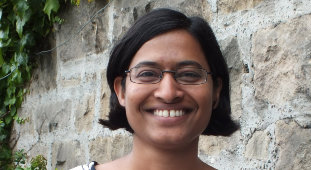Dundee to Host 2015 Qualitative Election Study of Britain
Published On Fri 13 Mar 2015 by Grant Hill

Researchers at the University of Dundee and GESIS-Liebniz Institute in Cologne, Germany are working intensively with voters to identify the issues, personalities and other factors that will decide this year’s General Election.
The 2015 Qualitative Election Study of Britain (QESB 2015), a project led by Politics Lecturer Dr Edzia Carvalho at Dundee and GESIS researcher Dr Kristi Winters, will conduct 20 focus groups before and after the May 7th vote to identify how the various party campaigns are resonating with the public. QESB 2015 aims to provide an insight into the reasons, opinions, and motivations underlying voting behaviour, rather than the statistics generated by opinion polls and other surveys.
The researchers will gauge the individual issues of greatest concern to the electorate and how they relate to and influence voting intentions. The post-election focus groups will look at whether participants changed support during the campaign and why.
The focus groups will be conducted in Scotland, England, and Wales. The researchers will investigate the role of safe and marginal seats in influencing how people vote, how voters evaluate party leaders, and reactions to the Leaders’ Debates, among other topics. The impact of the Scottish referendum outcome on voters and voting in Scotland will be explored at those focus groups held north of the border.
“2015 is shaping up to be a very important and interesting election year,” said Dr Carvalho. “Last year’s referendum and the subsequent growth on pro-independence parties, the rise of UKIP and the consequences of coalition government in recent years mean there are many more factors at play than you might normally expect in a UK General Election.
“Hearing from people will help us capture in their own words the range of issues and perspectives that informed their vote and flesh out the numbers gathered by polling. Many nations have national surveys at elections but the QESB is breaking new ground by collecting people’s words, not just their responses. It is a great for the University of Dundee to host this new approach to studying elections.”
Election studies take place across the world but the QESB hopes to set new standards in the field by mining beneath the raw data that such studies yield in order to understand influential factors on a more individual level. QESB 2015 has been supported by funding from the British Academy and Leverhulme Trust and the findings will be used together with research into the Scottish referendum conducted in December 2014.
The results of the five post-referendum focus groups with Yes and No voters and campaigners will be revealed at an event in the University’s D'Arcy Thompson Lecture at 3pm on Thursday, 28th March.
The event is free and open to the public. Places can be booked at https://scottish-referendum-dundee.eventbrite.com.
For media enquiries contact:
Grant Hill
Press Officer
University of Dundee
Nethergate, Dundee, DD1 4HN
TEL: 01382 384768
E-MAIL: g.hill@dundee.ac.uk
MOBILE: 07854 953277